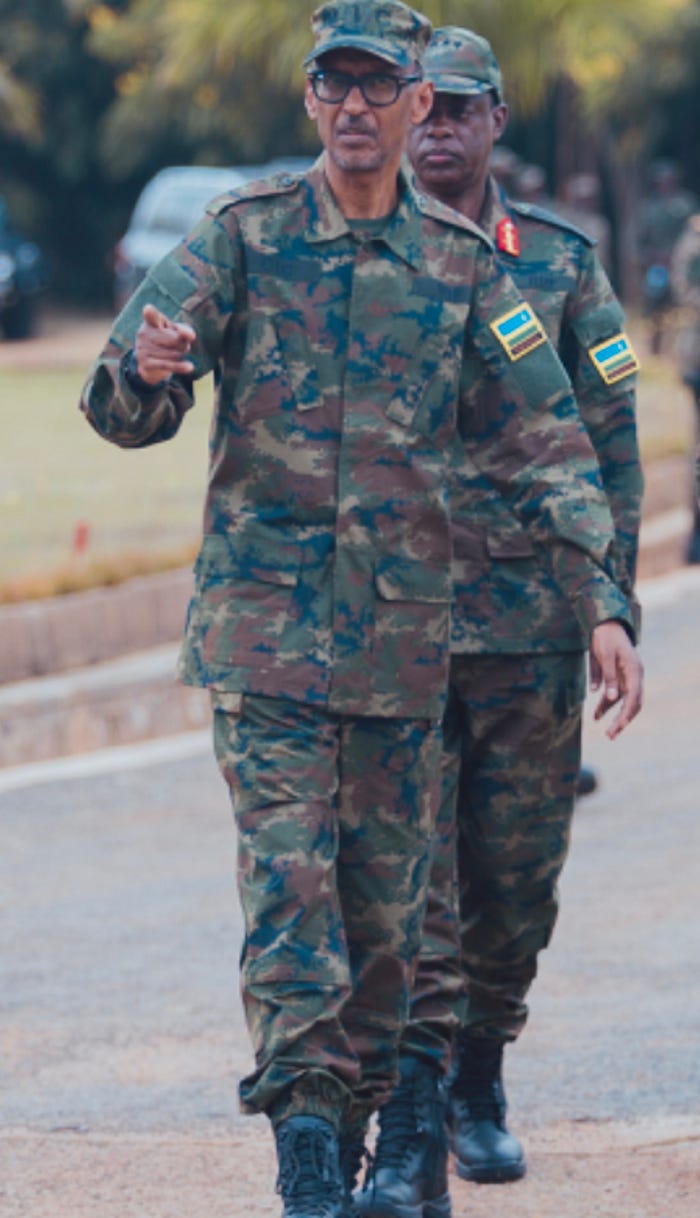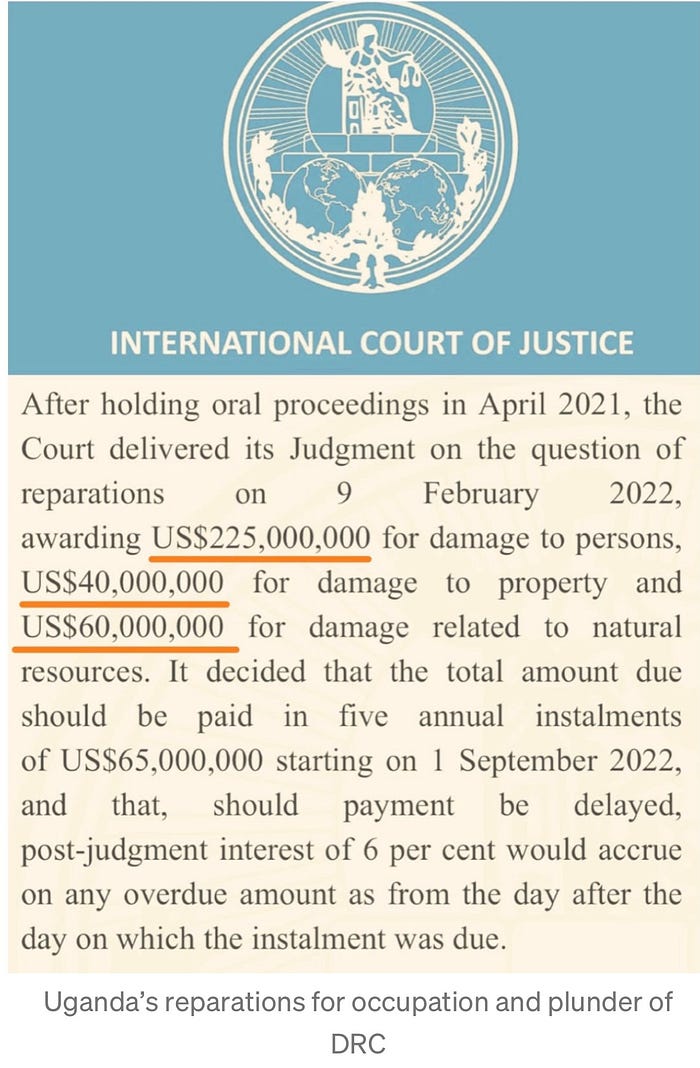By David Himbara
General James Kabarebe blames Rwandans for causing chaos in neighbouring countries. On the contrary, countries of the Great Lakes region, namely, Burundi, DR Congo, Rwanda, and Uganda, are victims of Kabarebe’s boss – General Paul Kagame. If Kabarebe’s blame game is intended to pin the barbarism of the Kagame regime on the people of Rwanda, he achieves the opposite. He is putting the spotlight on a worn-out regime grasping at straws and denying reality.

Generals Paul Kagame and James Kabarebe are conjoined, with the latter enforcing the former’s barbarism across the region
Kabarebe is the lone survivor of Kagame’s purging of the original members of the Rwandan Patriotic Army. Kabarebe began as the aide-de-camp to Kagame in 1990. Thirty-three years later, he is minister of state of foreign affairs, after serving in various roles including minister of defence, chief of defence staff of the Rwandan Defence Forces, and senior defence and security advisor to Rwanda’s ironman.
The conquerer of the Democratic Republic of Congo

It was therefore not surprising that Kagame chose Kabarebe to execute his barbaric campaign across the region. The initial assignment to Kabarebe was the removal of General Mobutu Sese Seko and the installation of Laurent-Désiré Kabila as DR Congo’s head of state. Kabarebe’s reward was his appointment as the Chief of Staff of the Congolese Army. However, the relationship between Kagame and Kabila soon collapsed, and Kabarebe was dismissed, leading to his second assignment.
Kagame then tasked Kabarebe to topple Kabila but on reaching Kinshasa, Kabarebe’s mission came to an abrupt end. The Kagame/Kabarebe’s plan was foiled when Angolan troops intervened in support of Kabila. Years later, the United Nations Security Council accused Kabarebe of being the de facto leader of the M23, the militia that unleashed all manner of atrocities in the eastern DR Congo.
The International Court of Justice ordered Uganda to pay US$325 million in reparations for its invasion and plumber of DRC

Kagame’s barbarism in DR Congo took a new turn when DR Congo took Uganda and Rwanda to the ICJ for the killing of millions of people and plundering mineral and natural resources. Uganda lost the case, with the Court awarding DR Congo US$225,000,000 for damage to persons, US$40,000,000 for damage to property and US$60,000,000 for damage related to natural resources.
Kagame escaped the trial using legal instruments instituted by the Kayibanda and the Habyarimana regimes to deny the ICJ jurisdiction

In the case of Rwanda, DR Congo maintained that the armies led by Kabarebe had killed 3.5 million people. The Kagame regime simply rejected the ICJ’s jurisdiction, using the legal instruments instituted by the Kayibanda and the Habyarimana regimes. Kayibanda refused to accede to the UN Convention on the Prevention and Punishment of the Crime of Genocide. Habyarimana acceded to the Convention, but inserted in Rwanda’s instrument of accession a reservation worded as follows:
“The Rwandese Republic does not consider itself as bound by Article IX of the Convention.”
Article IX of the Convention that Habyarimana rejected provides for the following:
“Disputes between the Contracting Parties relating to the interpretation, application or fulfilment of the present Convention, including those relating to the responsibility of a State for genocide or for any of the other acts enumerated in article Ill. shall be submitted to the International Court of Justice at the request of any of the parties to the dispute.”
Neither Kayibanda nor Habyarimana was prepared to give up his genocide weapon. And Kagame simply used the Habyarimana genocide weapon to block the ICJ’s jurisdiction. Kagame’s lawyers reminded the ICJ that “it lacks jurisdiction over the claims brought against the Republic of Rwanda by the Democratic Republic of the Congo.” Case closed.
Kayibanda and Habyarimana must be turning in their grave on learning that a Tutsi used their genocide weapon to slaughter Hutu and escape justice

On December 11, 1946, the United Nations approved and proposed for signature and ratification or accession to the Convention on the Prevention and Punishment of the Crime of Genocide. Hereafter genocide became a crime under international law. Disputes between the Contracting Parties relating to the Convention would be submitted to the International Court of Justice at the request of any of the parties to the dispute. Kayibanda would not ratify the Convention.
A year after he overthrew Kayibanda, Habyarimana came on board but did not ratify the Convention. Put another way, Habyarimana did not sign or give formal consent to the Convention, making it officially valid. Moreover, he inserted a reservation clause in Rwanda’s accession to the Convention that nullified the ICJ’s jurisdiction.
This legal manoeuvre gave Kagame an escape route. ICJ had no jurisdiction over Rwanda. And here is why Kayibanda and Habyarimana are turning in the grave. The Kabarebe’s interventions to install and remove Kabila turned into what the UN Congo Mapping Report called possible genocide against Rwandan Hutu refugees in DR Congo. As the report put it,
“Numerous serious attacks on the physical or mental integrity of members of the group were also committed, with a very high number of Hutus shot, raped, burnt or beaten…Thus the apparent systematic and widespread attacks described in this report reveal a number of inculpatory elements that, if proven before a competent court, could be characterized as crimes of genocide.”
The Kayibanda/Habyarimana’s sabotage of the ICJ incapacitated the only global institutional framework to hold Kagame and Kabarebe accountable for the slaughter of Hutu refugees in DRC.
Kagame’s barbarism in other countries of the Great Lakes Region

Kagame’s relations with other neighbours tanked as well. After Burundi accused Rwanda of engineering a coup d’etat in 2015, the military and political plotters were granted refugee status in Rwanda. This led to a diplomatic meltdown.
In the Ugandan case, Kagame and other members of his Rwandan Patriotic Front fought alongside the leader of the Ugandan Bush War, Yoweri Kaguta Museveni, who later supported their struggle in Rwanda. However, the former allies clashed in DR Congo when the two armies supported rival rebel groups who sought to oust Laurent Kabila. By 2019, the relations between Rwanda and Uganda had sunk so low that Kagame shut down the Rwanda-Uganda border until 2022.
In the blink of an eye, Kagame choked off commerce on East Africa’s busiest transport artery that funnels goods to and from the Kenyan seaport of Mombasa through Uganda to Rwanda, Burundi and the Eastern DR Congo. In other words, the 173 million people of the Great Lakes Region, including Rwandans, are affected by Kagame’s barbarism.
When former Tanzanian President Jakaya Kikwete suggested that Rwanda negotiate with various exiled opponents to end hostilities, Kagame went ballistic. Kagame publicly stated that he “will just wait for the right place and hit” Kikwete for uttering “such nonsense.” Tanzania then sent troops to join a special UN brigade that defeated and dismantled the Rwanda-supported M23 in DR Congo.
Fast-forward to Kabarebe’s speech on October 30, 2023:
“We have disrupted all the countries in our region. We have caused chaos – they are tired of us. If we tear ourselves apart, we have nowhere to go. No country will give us asylum. We no longer have any options. We have to live together here. We have nowhere else to go.”
Kabarebe’s atrocious claim that the people of Rwanda have caused chaos in the Great Lakes region is a case of blaming the victim

Kabarebe was born, educated and commissioned as a military officer in Uganda. He is, therefore, a perfect example of how Rwandans fare well in the neighbouring countries that after all share the same culture. Kinyarwanda is spoken in Rwanda, Burundi, the Democratic Republic of the Congo, Uganda and Tanzania. Urufumbira, spoken by the Bafumbira of the Kisoro District of Uganda, is a dialect of Kinyarwanda. Kabarebe’s sermon is a case of blaming the victim. The victim-blame phenomenon occurs when an individual attempts to cope with the destructive things he has done by pinning blame on the victim of the catastrophe.
The people of Rwanda are not party to Kagame and Kabarebe’s atrocities in the region but are victims. The basis of the horrifying barbarism in the Great Lakes Region is the concentration of power in the hands of the Rwandan ironman. And he is set to grab power for a fourth term after 30 years at the helm.
How might the story end? Since Kanjogera’s coup d’etat and the ensuing massacres of 1896, no Rwandan ruler left the high office peacefully. Post-independence Rwanda is a horror show. Habyarimana wiped out the entire Kayibanda government and the Gitarama ruling elite. Habyarimana was shot down from the sky. As Kagame cements his life presidency, he ought to reflect on the words of the great German philosopher Georg Hegel: “The only thing we learn from history is that we learn nothing from history.” Stay tuned.




























































